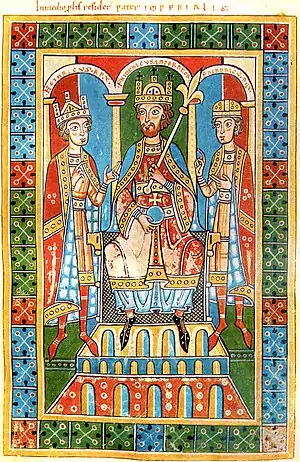1155
Year 1155 (MCLV) was a common year starting on Saturday (link will display the full calendar) of the Julian calendar.
| Millennium: | 2nd millennium |
|---|---|
| Centuries: | |
| Decades: | |
| Years: |
| 1155 by topic |
|---|
| Leaders |
|
| Birth and death categories |
| Births – Deaths |
| Establishments and disestablishments categories |
| Establishments – Disestablishments |
| Art and literature |
| 1155 in poetry |
| Gregorian calendar | 1155 MCLV |
| Ab urbe condita | 1908 |
| Armenian calendar | 604 ԹՎ ՈԴ |
| Assyrian calendar | 5905 |
| Balinese saka calendar | 1076–1077 |
| Bengali calendar | 562 |
| Berber calendar | 2105 |
| English Regnal year | 1 Hen. 2 – 2 Hen. 2 |
| Buddhist calendar | 1699 |
| Burmese calendar | 517 |
| Byzantine calendar | 6663–6664 |
| Chinese calendar | 甲戌年 (Wood Dog) 3851 or 3791 — to — 乙亥年 (Wood Pig) 3852 or 3792 |
| Coptic calendar | 871–872 |
| Discordian calendar | 2321 |
| Ethiopian calendar | 1147–1148 |
| Hebrew calendar | 4915–4916 |
| Hindu calendars | |
| - Vikram Samvat | 1211–1212 |
| - Shaka Samvat | 1076–1077 |
| - Kali Yuga | 4255–4256 |
| Holocene calendar | 11155 |
| Igbo calendar | 155–156 |
| Iranian calendar | 533–534 |
| Islamic calendar | 549–550 |
| Japanese calendar | Kyūju 2 (久寿2年) |
| Javanese calendar | 1061–1062 |
| Julian calendar | 1155 MCLV |
| Korean calendar | 3488 |
| Minguo calendar | 757 before ROC 民前757年 |
| Nanakshahi calendar | −313 |
| Seleucid era | 1466/1467 AG |
| Thai solar calendar | 1697–1698 |
| Tibetan calendar | 阳木狗年 (male Wood-Dog) 1281 or 900 or 128 — to — 阴木猪年 (female Wood-Pig) 1282 or 901 or 129 |

Emperor Frederick I (middle) flanked by his two sons, Henry VI and Frederick VI.
Events
Europe
- Siege of Tortona: German forces capture the citadel of Tortona (after a two-month siege). The city is razed to the ground, including the graves.
- June 18 – King Frederick I (Barbarossa) is crowned as Emperor of the Holy Roman Empire by Pope Adrian IV at St. Peter's Basilica in Rome.
- Arnold of Brescia is exiled by Adrian IV and forced to flee. He is arrested by imperial forces; hanged and his body burned at the stake in Rome.
- The city of Bari rebels against King William I (the Bad) of Sicily and recognizes the Byzantine emperor, Manuel I (Komnenos), as its overlord.[1]
- The Virgin of Vladimir (or Our Lady of Vladimir) is taken by Grand Prince Andrey Bogolyubsky to Vladimir from Suzdal.
England
- Spring – King Henry II has the Palace of Westminster (which is badly damaged by Stephen's supporters during The Anarchy) repaired. Thomas Becket, archbishop of Canterbury, is given the task of repairing the buildings.
- Henry II subdues the English nobles who have become too powerful during the civil war. He takes Bridgnorth Castle and Scarborough Castle.
- Henry II grants the city of Bristol (or Brycgstow) a Royal charter, and is divided between Gloucestershire and Somerset (until 1373).
- New Year's Day is changed from January 1 to March 25.[2]
Asia
Religion
- A plan to conquer Ireland is approved by Adrian IV in a Papal Bull (a formal proclamation issued by the pope) called Laudabiliter. It gives Henry II lordship over Ireland, but the Irish kings resist English rule.
- Summer – Robert of Chichester becomes bishop of Exeter (until 1160).
Births
- February 28 – Henry the Young King, son of Henry II (d. 1183)
- May 17 – Jien, Japanese poet and historian (d. 1225)
- November 11 – Alfonso VIII, king of Castile (d. 1214)
- Abu Muhammad Salih, Almohad Sufi leader (d. 1234)
- Benkei, Japanese warrior monk (sōhei) (d. 1189)
- Bernard d'Armagnac, French nobleman (d. 1202)
- Fujiwara no Ariie, Japanese nobleman (d. 1216)
- Fujiwara no Yasuhira, Japanese nobleman (d. 1189)
- Geoffrey de Saye, English nobleman (d. 1230)
- Kamo no Chōmei, Japanese waka poet (d. 1216)
- Maud de Braose, English noblewoman (d. 1210)
- Ottokar I, duke of Bohemia (approximate date)
- Sicard of Cremona, Italian prelate (d. 1215)
- Taira no Tokuko, Japanese empress (d. 1214)
Deaths
- June 4 – Baldwin de Redvers, English nobleman
- June 10 – Sigurd II, king of Norway (b. 1133)
- June 11 – Kenkai, Japanese Buddhist monk (b. 1107)
- August 22 – Konoe, emperor of Japan (b. 1139)
- November 18 – Qin Hui, Chinese politician (b. 1090)
- Arnold of Brescia, Italian priest and rebel (b. 1090)
- Fujiwara no Akisuke, Japanese nobleman (b. 1090)
- Geoffrey of Monmouth, English historian (b. 1095)
- Li Qingzhao, Chinese poet and writer (b. 1084)
- Minamoto no Yoshikuni, Japanese samurai (b. 1082)
- William de Mohun, English nobleman (b. 1090)
References
- Kleinhenz, Christopher (2010). Medieval Italy: an encyclopedia. New York: Routledge. p. 95. ISBN 978-0-415-93930-0.
- Catholic Encyclopedia, General Chronology (Beginning of the Year).
This article is issued from Wikipedia. The text is licensed under Creative Commons - Attribution - Sharealike. Additional terms may apply for the media files.